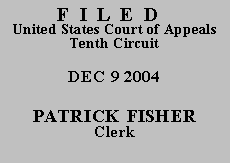

| JAMES H. GORDON, |
|
| v. | |
| RON WARD, Director, |
We grant a COA only if Applicant "has made a substantial showing of the denial of a constitutional right." 28 U.S.C. § 2253(c)(2). This demonstration "includes showing that reasonable jurists could debate whether . . . the petition should have been resolved in a different manner or that the issues presented were adequate to deserve encouragement to proceed further." Slack v. McDaniel, 529 U.S. 473, 484 (2000) (internal quotation marks and citation omitted).
An Oklahoma jury convicted Applicant of grand larceny after former conviction of two or more felonies. He was sentenced to 40 years' imprisonment. The Court of Criminal Appeals of the State of Oklahoma (OCCA) affirmed his conviction. He was denied post-conviction relief in state court. The OCCA affirmed the denial. Applicant then filed this application for relief under 28 U.S.C. § 2254 in the United States District Court for the Western District of Oklahoma. The district court adopted the magistrate judge's Report and Recommendation and denied the application.
Applicant asserts in his application that (1) his conviction was not supported by sufficient evidence and (2) prosecutorial misconduct deprived him of his due process right to a fundamentally fair trial. He raised both these grounds in his direct appeal in state court. We may not grant him relief with respect to a claim adjudicated on the merits by the state court unless the adjudication
(1) resulted in a decision that was contrary to, or involved an unreasonable application of, clearly established Federal law, as determined by the Supreme Court of the United States; or
(2) resulted in a decision that was based on an unreasonable determination of the facts in light of the evidence presented in the State court proceeding.
28 U.S.C. § 2254(d). Our review of Applicant's claims under this standard reveals that neither merits a COA.
Applicant contends that the evidence at trial was insufficient to prove that the value of the item taken from J.C. Penney, a comforter, was in excess of $50. At trial, two J.C. Penney's loss-prevention officers testified that the value of the comforter was $145, based upon checks of the price tag and the lot number. Both witnesses testified that the comforter was not on sale at the relevant time. Applicant countered this testimony by testifying that he observed in a J.C. Penney's catalog that the sale price of the comforter was $29.99. The OCCA held that "[d]espite conflicting testimony, a rational trier of fact could find beyond a reasonable doubt that the value of the comforter was over $50." Gordon v. State, No. F-2001-339, Summary Opinion at 2 n.1 (Okla. Crim. App. Feb. 20, 2002) (unpublished).
Applicant also asserts that he was denied a fair trial because of prosecutorial misconduct. Although he does not specify in his application any comments made by the prosecutor, he argued in his direct appeal that the prosecutor improperly attempted to define "beyond a reasonable doubt" for the jurors during voir dire and that the prosecutor had improperly attacked his credibility during closing argument. The OCCA reviewed this claim for plain error and determined that Applicant had failed "to show any prejudice resulting from the prosecutor's comments." Id. at 2. It further stated: "The prosecutor's comments during voir dire that 'reasonable doubt' does not mean 'beyond a shadow of a doubt' or 'beyond all doubt' does not constitute error. Also, the prosecutor's comments during closing arguments did not constitute error because they were supported by the evidence." Id. at 2 n.2 (citations omitted).
Applicant has failed to show that the state court's decision was contrary to or involved an unreasonable application of clearly established federal law or was an unreasonable determination of the facts in light of the evidence presented. Jurists of reason would not debate whether the district court properly denied his application. For substantially the same reasons set forth in the district court's June 14, 2004, Order and the magistrate judge's May 20, 2004, Report and Recommendation, we DENY a COA and DISMISS the appeal.
ENTERED FOR THE COURT
Harris L Hartz
Circuit Judge